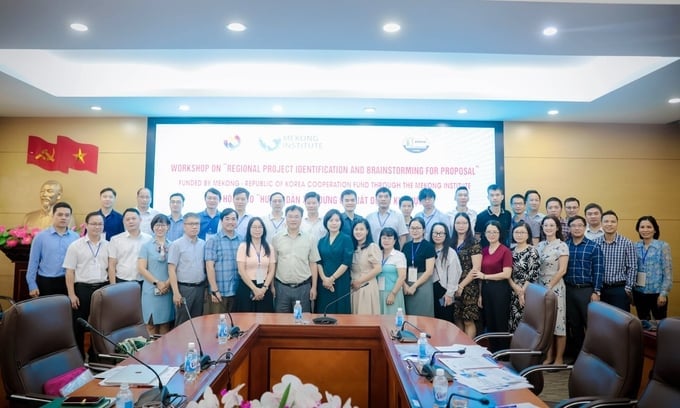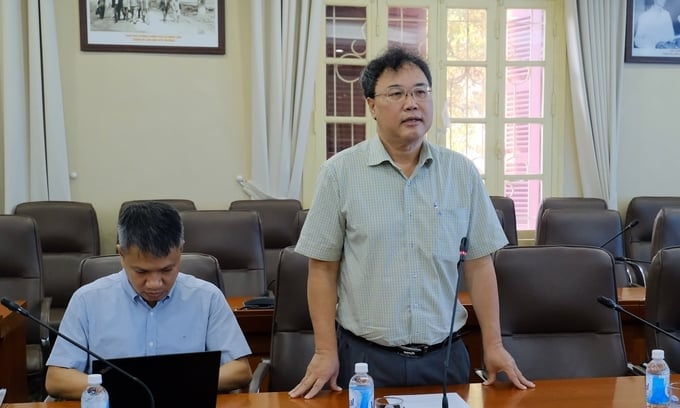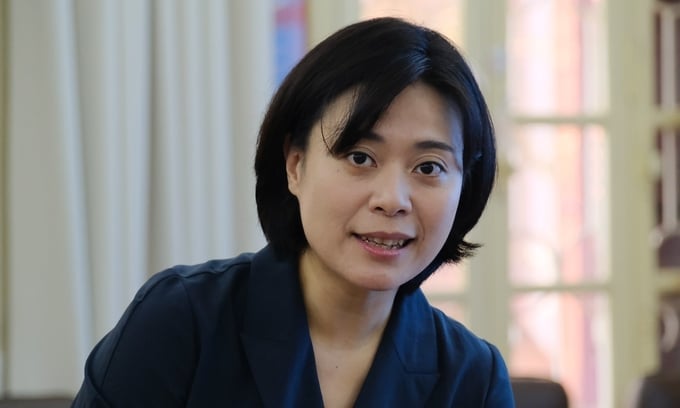December 8, 2025 | 11:31 GMT +7
December 8, 2025 | 11:31 GMT +7
Hotline: 0913.378.918
December 8, 2025 | 11:31 GMT +7
Hotline: 0913.378.918

Delegates attending the conference. Photo: TLU.
On October 18, Thuy Loi University coordinated with the Mekong Institute, the coordinating agency of the Mekong-Republic of Korea Cooperation Fund (MKCF), to organize a workshop on "Guidelines for developing regional project proposals" in Project Framework "Enhancing Capacity in regional project design, implementation, monitoring and evaluation of MKCF Project".
Hyeyoung Lee, Project Manager of the MKCF Project, shared six priority areas in the 2011 Mekong - Han River Declaration. They are Infrastructure, Information technology and telecommunications, Water resources development, Green growth, Agriculture and rural development, and Human resource development.
The five Mekong countries (Cambodia, Laos, Myanmar, Vietnam, and Thailand) and Korea have agreed that the MKCF will be funded through Korea's annual contribution to the Mekong Institute (MI), which is managed by the MI and serves as the Fund Coordinating Authority.
MKCF Project's activities are within the framework of The Korea-ASEAN Solidarity Initiative (KASI). In particular, the Korean Government committed to increasing the scale of project operations. The MKCF's budget can be up to US$10 million/per year.
Compared to before, the action plan of ASEAN - Korea cooperation has a new content: solving non-traditional challenges. Project Manager Hyeyoung Leee pledged that the MKCF will prioritize resources to solve projects related to this issue.

Associate Professor Dr. Nguyen Canh Thai highly appreciated the impact of the MKCF project. Photo: TLU.
Further clarifying Hyeyoung Lee's opinion, Dr. Bui Thai Quyen, Institute of Labor Sciences and Social Affairs, noted the field of agricultural cooperation in implementing the Mekong - Han River Declaration. Based on prosperity through sharing experiences, the two sides will focus on developing the regional agricultural value chain and strengthening the regional agricultural supply chain.
At the same time, cooperate to improve agricultural productivity in the Mekong River region, develop rural financial services, develop markets, and promote digital transformation.
During implementation, the MKCF will sponsor projects of a regional nature, consistent with the country's priorities to solve multinational problems and create favorable conditions for the integration process.
The funded project can be implemented in a single country while sharing benefits between countries in the Mekong region and Korea to promote cooperation and integration in the Mekong subregion.
As the sponsoring unit to organize the conference, Associate Professor Dr. Nguyen Canh Thai, Vice Rector of Water Resources University, shared that the conference is an opportunity for relevant and interested parties to improve their research proposal capacity and training of projects serving the community and social development.
"The school hopes that through the conference, representatives of units and teachers will grasp the processes and orientations for building appropriate project proposals, contributing to promoting research cooperation between Vietnam and the countries of the Greater Mekong Subregion (GMS) through research project proposals supported by the MKCF," Mr. Thai said.

Mrs. Hyeyoung Lee stated some priority areas in the MKCF project framework. Photo: TLU.
Through the presentations presented by experts from the Office of the Vietnam Mekong Committee, the leaders of Thuy Loi University hope that the entire process and orientation of project proposal development will be discussed to be consistent with reality, contributing to promoting research cooperation between Vietnam and the Greater Mekong Subregion countries through research project proposals supported by MKCF.
In recent years, with the development orientation of being a multidisciplinary school, Thuy Loi University has actively expanded its cooperation with international and domestic partners. Many scientific research projects have supported the school's teachers and students in approaching many practical problems, contributing to improving their professional qualifications and being a great source of support for training students.
Many programs, projects, and support funds regularly call on research units and training institutions to propose projects with many innovation goals, find valuable solutions for the community, contribute to sustainable social development, and promote each donor agency's individual goals.
"Each sponsoring unit has its own goals and criteria for selecting research suitable to development orientation. That is something we need to consider and research carefully," Mr. Thai emphasized.
A representative of the Department of International Cooperation, Ministry of Agriculture and Rural Development, informed that projects implemented from the MKCF need to pay attention to the implementation progress because the process of synthesizing and submitting to the Ministry of Foreign Affairs is time-consuming and requires registration procedures.
Translated by Tuan Huy

(VAN) After three years, Project FST/2020/123 collected approximately 3,000 insect specimens, classified them into about 50 morphological groups, and identified around 40 species, including several new species.
/2025/12/01/0509-2-175427_206.jpg)
(VAN) Emission-reducing coffee areas in Lam Dong have entered the new crop with stable yields, improved quality, and a remarkably enhanced cultivation environment.

(VAN) The Institute of Agricultural Sciences for Southern Vietnam (IAS) marked its 100th anniversary in Ho Chi Minh City, celebrating a century of growth as a leading institute contributing significantly to Viet Nam’s agricultural development.

(VAN) An increasing number of livestock farms are using biogas generators to create a source of renewable electricity, helping to save costs and mitigate environmental pollution.

(VAN) Small changes in rice cultivation, from irrigation methods and straw collection to input management, are paving a new way for Vietnam's agriculture in the journey toward emission reduction.

(VAN) With the project of converting biogas into renewable electricity, Australia is both helping pig farms reduce their energy costs by up to 25% and contributing to environmental protection.
![Hue aims for Net Zero: [1] Initial steps from green transportation](https://t.ex-cdn.com/nongnghiepmoitruong.vn/608w/files/huytd/2025/11/28/0853-anh-6-giao-thong-xanh-hue-094717_940-153724.jpg)
(VAN) For sustainable development, Hue City is implementing many solutions to promote green transportation, which is an important initial step on the journey to building a Net Zero Hue.